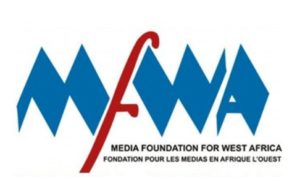MFWA to pay GH¢1,500 to NCA for information on closure of TV stations
 A Human Rights Court (High Court Division) has asked the Media Foundation for West Africa (MFWA) to pay GH¢1,500 to the National Communication Authority (NCA) to be furnished with information on closure of television stations.
A Human Rights Court (High Court Division) has asked the Media Foundation for West Africa (MFWA) to pay GH¢1,500 to the National Communication Authority (NCA) to be furnished with information on closure of television stations.
The NCA had requested the MFWA to pay GH¢2,000 for the Foundation to be provided with information on why television stations were closed down in the country.
A statement issued by the NCA in Accra, after the Court’s ruling, said the Court held that MFWA had failed to establish the basis for the claim that its request was in the public interest and upheld the NCA’s contention that the public interest argument was an afterthought.
It said the NCA would endeavor to execute its mandate as set out by law and that, “The Authority’s doors are always opened to engage its many stakeholders provided this is done through due process.”
MFWA sued the NCA at the Human Rights Court (1) for failing to provide certain public information as requested by the Foundation in line with the Right to Information Act, 2019 under Article 21(1) of the 1992 Constitution.
The MFWA through its Executive Director, Sulemana Braimah, on July 22, 2020, submitted an access to information request to the NCA in exercise of rights guaranteed under Article 21 (1) (f) of Ghana’s 1992 Constitution and under Ghana’s Right to Information Act, 2019 (Act 989), but the information was not provided, hence the decision to take the action against the NCA.
The MFWA had requested from the NCA the full list of all radio stations (indicating name of company, name of radio station, location, and frequency number) that it had shut down following the Authority’s year 2017 FM spectrum audit, which according to the NCA, was in line with the 2018 decision of the Electronic Communications Tribunal.
The MFWA also requested for the full list of all authorised radio stations as of the second quarter of 2020, with indications of the dates of first authorisation, dates of last authorisation renewals, locations, and operational status of the radio stations – that is whether they are on air or off-air.
The MFWA also wanted to know the reasons why the NCA made changes to exclude certain information from its published 2020 second-quarter report titled: “List of Authorised VHF-FM Radio Stations in Ghana as at Second Quarter 2020,” compared to other similar reports previously issued by the Authority.
According to the MFWA, after making the request on July 22, 2020, the NCA acknowledged receipt of the request but failed to provide the necessary information within the statutory 14 days.
The MFWA said after failing to provide the information requested within the 14 days, another request was made on August 18, last year for the same information.
The Foundation said in a reply to its requests, the NCA said it was not going to provide explanations for the changes it made to its report.
It said later, the NCA asked the Foundation to pay GH¢2,000 ($345) to enable it generate the requested information, and explained that the amount being charged was based on its law, the Electronic Communications Act.
The MFWA, therefore, filed a suit against the NCA for breaching the fundamental right to access information.
The Foundation averred in the suit that the NCA had acted “unconscionably, unjustifiably, unreasonably, unfairly and arbitrarily and in breach of specific provisions of Act 989 complained about in the suit.”
It, therefore, prayed the Court, presided over by Justice Gifty Agyei, to declare that the decision and demand by NCA contained in its letters dated July 29, 2020 and August 20, 2020, were unlawful, unreasonable, unfair, and in violation of the Foundation’s constitutional and fundamental right to access information.
The MFWA also wanted the Court to declare that the amount of GH¢2,000 demanded by NCA from the Foundation to generate the information constituted constructive denial, refusal, failure or neglect, and breach of the Foundation’s right to information under Article 21(1) (f) of the Constitution.
The Foundation was praying the Court to declare that the amount demanded is not only unlawful, but unconscionably exorbitant in breach of the letter and spirit of Act 989 and applicant’s fundamental rights to information.
It also wanted the Court to declare that the information requested by the Foundation could not be subjected to a charge or a fee.
The MFWA was also seeking an Order of the Court in enforcing its rights to information under Article 21(1) (f) of the Constitution by compelling the NCA to provide the information requested.
Source: GNA
